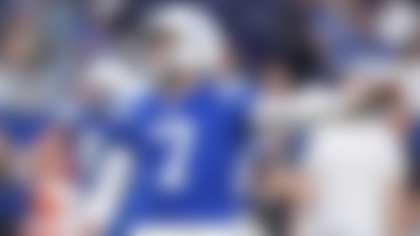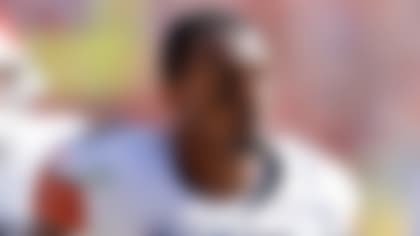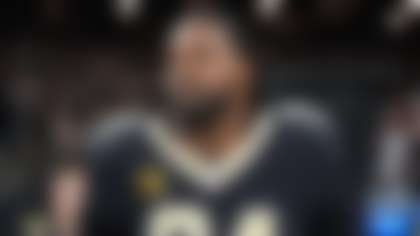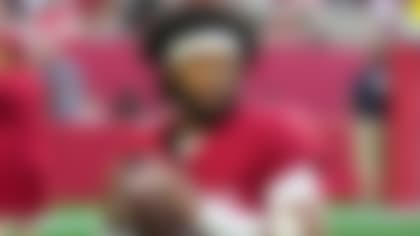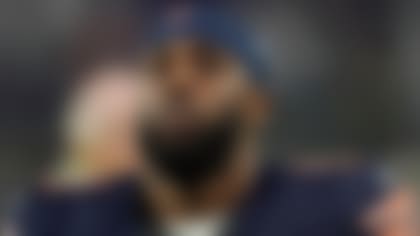"Relentlessly, the machine stomps on!"
In John Malkovich's dramatic rendering of the AFC Championship Game preview, Bill Belichick and Tom Brady are cast as twin Goliaths, stomping their annual 100-yard path to football immortality.
It's a captivating image. As Vince Lombardi once cautioned, though, beyond the blocking and hitting lies mere mythology.
Long before the rise of professional sports, the wisest among our species reached the reckoning that time and tide wait for no man.
The Patriots have been waging their own unwinnable war versus the inexorable march of time for nearly a decade. Opponents have been cherishing dreams of the dynasty's demise ever since the Ravens breached Foxborough's walls with a 33-14 victory that brought a premature end to New England's 2009 season.
We can never achieve total victory over time, but we can interrogate limits. When we break the sound barrier, implant the artificial heart or erase the four-minute mile, we achieve partial victory by expanding the boundaries of human possibility.
For Belichick and Brady, there is no truce to be made with the clock. They've only grown stronger since that January 2010 playoff loss to Baltimore, following a 14-2 campaign with seven consecutive trips to the conference title game and four more Super Bowl appearances.
Along the way, Brady has morphed into a lifestyle pioneer, obsessed with his self-appointed role as ambassador to athletic longevity.
"This is the right thing. Just do it," Brady proselytized in a post-Super Bowl LI interview with The MMQB's Peter King. "And you'll see all the benefits that I've seen. This is going to be the norm in 10 years. I actually think it's going to make for a more competitive game, when you have so many players that are so healthy for long periods of times. I think the caliber of talent is going to be so much better."
How long would it take for that mission to run headlong into Belichick's mandate to invest in a post-Brady future?
Successful pro quarterbacks don't turn stale over time. The fall is sudden and steep. Armed with that undeniable history lesson, New England's bipedal pigskin encyclopedia began casting about for Brady's replacement as far back as 2011, drafting a succession of quarterbacks that ultimately resulted in the great Jimmy Garoppolo conundrum of 2017.
After 17 years of hegemony, the unshakeable pillars underpinnning the NFL's longest-running dynasty began to show signs of cracking early last month. When ESPN's Seth Wickersham published a long-form piece alleging internal conflict atop the Patriots' organization chart, it was abundantly evident that the rift stemmed from the shocking deadline trade that sent Garoppolo to San Francisco for the bargain rate of a second-round draft pick.
Basking in a magical stretch run to close out a lost season, 49ers fans quickly understood why Garoppolo was Belichick's golden boy, previously untouchable in offseason trade talks.
Incubated under the watchful eyes of Belichick and quarterback guru Josh McDaniels, Garoppolo flashed difference-making potential during Brady's 2016 suspension.
In his first career start, Jimmy G went on the road in a nationally televised season opener and mowed down a consensus Super Bowl contender. A week later, he was the best player on field vs. Miami, throwing three touchdown passes before exiting the field in the second quarter with a shoulder injury. Those six quarters of game film showed impressive command of the offense, poise versus the blitz, a lightning-quick release, light feet to slide in the pocket and escape pressure, excellent ball placement on tight-window throws and the arm talent to change speed on his passes. Even better, the developing quarterback worked through his progressions, kept his eyes up, spread the ball around to all of his targets and even showed the subtle veteran move of looking off a safety on a touchdown throw to Martellus Bennett.
In short, those performances in game action affirmed what teammates and coaches had witnessed in the previous two years of practices.
The Ringer's Michael Lombardi, formerly Belichick's right-hand personnel man, insisted last offseason that Patriots teammates would line up to testify on behalf of Garoppolo's obvious potential.
"I've watched this guy practice and play for too many practices. This guy is a good player," Lombardi raved in early March. "And I'm not shilling for Belichick. ... I'm telling you, he's worth the Patriots to hold onto him. If I was in New England, I'd be telling Belichick every day, 'There's no way we can trade him.' "
Lombardi went on to relay stories of players and coaches walking off the practice field and shaking their heads in disbelief at Garoppolo's ability.
"Ask any player who leaves New England," Lombardi continued. "You can just randomly call a guy. ... They'll all tell you he's great."
Was this hyperbole? Was Lombardi simply doing Belichick's bidding, goosing Garoppolo's trade value?
Around the same time, Julian Edelman labeled Garoppolo a "stud" with a "gunslinger confidence" reminiscent of Brett Favre and Aaron Rodgers. Fellow wideout Chris Hogan was just as effusive, predicting that Garoppolo would be real successful once he got a chance to run his own offense.
"I played against him every day in practice," the former teammate raved. "He's all that. He can make all the throws. He can process all the information. He is a gamer. He can slow it down. He can spin it."
Former Browns quarterback Josh McCown bolstered that testimony with his own evaluation.
"I've seen him on tape because we had a common opponent in Miami," McCown explained. "He made some high-level throws and did some things that would get you excited about his ability to maybe carry a franchise. That's definitely on the tape. ... I certainly see why people would give him an opportunity to come in and be a franchise guy."
While the checkered history of Brady's former backups provoked skepticism from afar, Belichick paid his No. 2 quarterback a rare compliment, insisting the transition was "really seamless" when Garoppolo stood in for Brady during first-team practice drills.
"Certainly we have a good quarterback in Jimmy," Belichick added, "and Jimmy could go out there and run everything that Tom can run. We've seen that."
Belichick's quarterback room had evolved to the envy of the league, conjuring up images of Joe Montana giving way to Steve Young, and Aaron Rodgers taking the baton from Brett Favre.
"Bill, beyond thinking this kid was a special football player, thought he was a special person," 49ers general manager John Lynch said after acquiring Garoppolo. "And he just said, 'You're gonna love the player, guys respond to him.' "
If Belichick's conviction was so unwavering, why did he end up capitulating?
Upon closer inspection, the transition from one generational talent to another would never be as seamless as the transition from Brady's reps to Garoppolo's on the practice field.
Unlike the increasingly brittle Montana, Brady's body showed no signs of breaking down in the twilight years of his career. Against all odds, he has reached the age-40 barrier as the lone ever-developing quarterback in NFL history.
Unlike the famously-fickle Favre, Brady scorned the very thought of retirement, fixating on conquering the final frontier of mid-40s stardom.
To that end, Brady has turned to biometrics guru Tom House, seeking incremental improvement with each passing year.
"The aging process is unforgiving," House recently explained in the "Tom vs. Time" documentary. "He's not going to be able to do at 70 what he's doing now. But you can push that curve back by doing what he's doing.
"Old age and treachery always overcomes youth and exuberance. He went through his youth and exuberance. He's into old age and treachery right now. He's mastered as much or more information and instruction than probably anybody in the history of football, and he's still on the journey."
That notorious defiance of Father Time forced Belichick's hand, placing his Garoppolo plans on permanent hiatus.
Modern football's preeminent strategist and team builder, Belichick has nothing left to prove. He's reached the legacy-building phase of an unparalleled career, chasing a championship each season for the foreseeable future.
Who better than Brady as a sidekick on those journeys?
Going back a full century to the golden days of Notre Dame's fabled Four Horsemen backfield, Knute Rockne had established the Platonic ideal of offense with quarterback Harry Stuhldreher functioning as the head coach's "alter ego" out on the gridiron. The key that unlocks the Holy Grail of championship-level football is a quarterback possessed of coach-like powers of perception at the line of scrimmage.
As tempting as it might have been to untap Garoppolo's prodigious potential, Belichick must understand that Brady has evolved into his perfect on-field alter ego, parlaying hard work into hardware. The ultimate goal of all professional athletes is to maintain their physical gifts long enough to maximize the hard-earned wisdom accrued through endless hours of deliberate experience. If a post-baseball Michael Jordan stands as the ultimate grandmaster -- half Yoda, half Skywalker -- Brady is closing the gap.
Over the past four playoffs, Brady has brought the Patriots back from double-digit second-half deficits four times -- a feat no other franchise has come close to matching in the annals of postseason history. Those epic comebacks have generated a 78.0 completion rate at 8.9 yards per attempt in the fourth quarter and overtime, good for an astonishing 134.0 passer rating with legacies on the line.
Bobby Layne and Johnny Unitas invented the two-minute drill in the 1950s. Brady has spent the past half-decade perfecting that clock cheat code, bending the outcome to his indomitable will.
As Belichick battles time and tide in his quest for unprecedented glory, what better weapon to wield than the quarterback who slows the sands of the hourglass?

